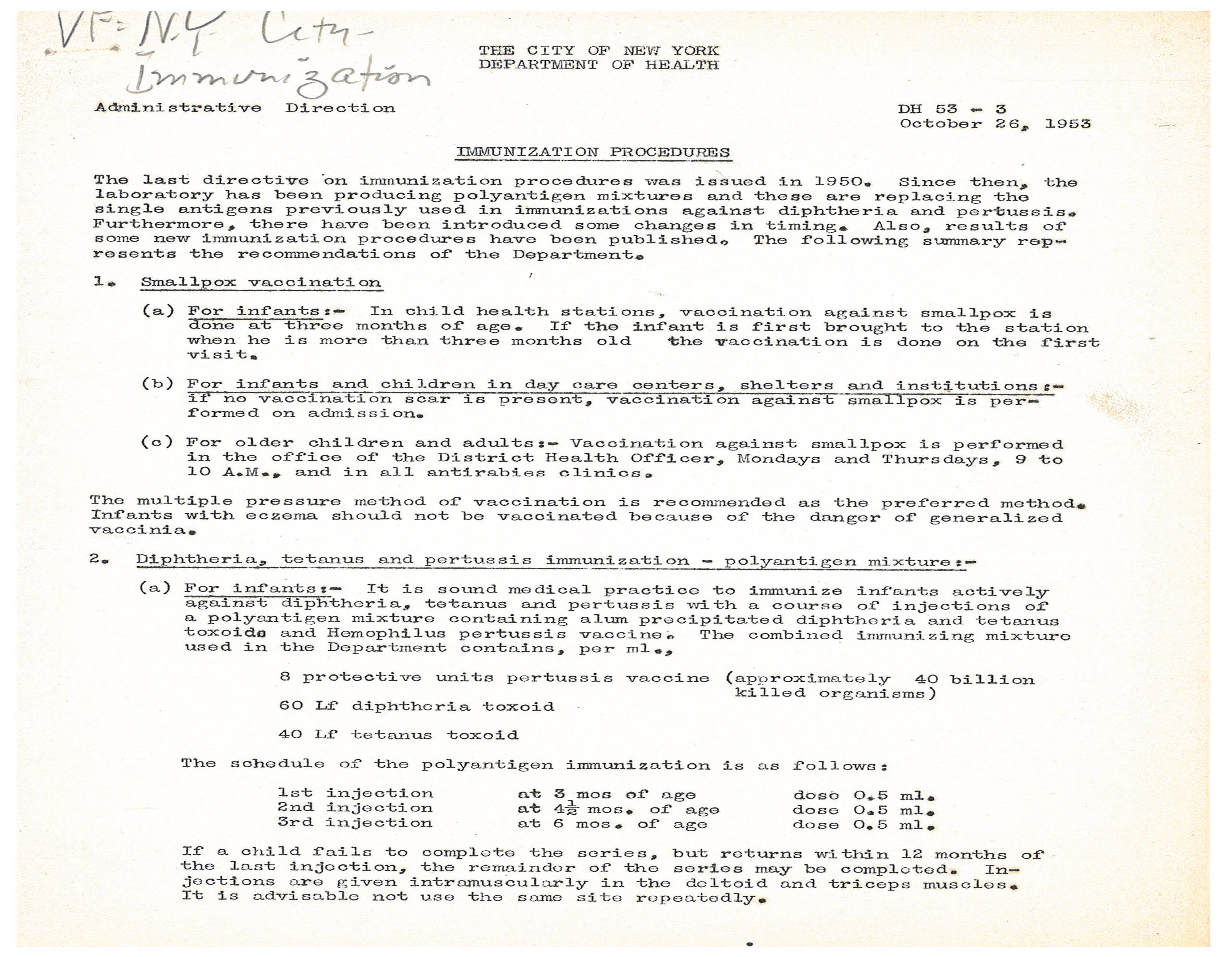|
|
Spotlight on: Immunizations |
|
By Christine Bruzzese, Director, Municipal Library |
|
|
Vaccines are being developed and distributed to fight the coronavirus pandemic and immunize the population. Historically, many vaccines have been developed to offer immunity and have been successful in almost eliminating potentially deadly diseases such as smallpox, typhoid, and polio. Edward Jenner is credited with offering the first vaccine in Europe in 1797. In 1953, the New York City Department of Health issued a circular revising the immunization procedure for diseases such as smallpox tetanus, diphtheria, measles and whooping cough. This document gives information about the dosages that should be administered to various age groups and in what settings. Below is an image from the instructions for smallpox immunization.
New York City suffered through a smallpox outbreak in 1947. In lieu of a novel, Cosmopolitan magazine published a report on the epidemic in April 1948. The article describes how smallpox arrived in the city, probably brought in by a couple travelling to New York. A month later, smallpox had broken out in many areas of the city. Fortunately, a sufficient supply of vaccine was available, and six million people were inoculated in the course of one month. The story includes such elements as doctors racing to diagnose and then contain the illness, the work of disease detectives, the response of public officials, skepticism about the smallpox vaccine, rush for citizens to get vaccinated and federal government reaction. There were even people convinced that the smallpox outbreak was a hoax! Sound familiar? Diligent efforts by the medical community, widespread vaccination and public awareness campaigns helped save the day. In 2002, New York City was dealing with another smallpox scare and there was some concern that a side effect of the vaccine triggered heart attacks. An article published in the New York Times reports that Dr. Thomas Frieden, then- NYC Health Commissioner, requested from the Municipal Archives copies of all death certificates filed in1947. The purpose was to determine if there was a relationship between deaths caused by heart-attack and the smallpox vaccination. Health officials conducted the survey and the rumor was dispelled. The interested researcher can search the Library catalog and Archives collections for more resources. Please be sure to send any research inquiries to research@records.nyc.gov. Make A Difference in the New YearMadeline BankAre you interested in taking on a new project in 2021? Looking for a meaningful way to connect with others while still socially distancing? Consider volunteering virtually on two of our story-gathering community outreach projects, Neighborhood Stories and WomensActivism.NYC. Both projects offer volunteers the opportunity to make a difference by enriching the Archives with the stories of everyday extraordinary people. Neighborhood Stories endeavors to "put the community in the archive" by empowering local residents to provide their own rich historical narrative, and to encourage them to reflect on how the past connects to their lives, their families and their future. Volunteers will conduct audio-recorded interviews with long-time residents across the city. WomensActivism.NYC is a crowd-sourced, digital archive spearheaded by DORIS to celebrate the 100th anniversary of women gaining the right to vote in the United States. Volunteers for this project gather existing stories and write new narratives about inspiring women, as well as motivate and train others in their network to do so too. As both projects are entirely virtual, you can engage with history all from the comfort of your home – while making a lasting impact on your community. If you would like to make volunteering a resolution that you keep this year, simply sign up at this link: http://bit.ly/VolunteerWithDORIS. |
|

